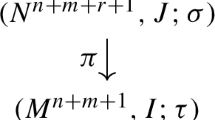Abstract
Infinite-dimensional perturbations in all constraints of an optimal control problem governed by a Volterra integral equation with the presence of a state constraint are considered. These perturbations give rise to a value function, whose analysis through the proximal normal technique provides sensitivity, controllability, and even necessary conditions for the basic problem. Actually all information about the value function is contained in Clarke's normal cone of its epigraph, which can be characterized by the proximal normal formula.
Similar content being viewed by others
References
L. D. Berkovitz, A penalty function proof of the maximum principle, Appl. Math. Optim., 2 (1976), 291–303.
J. M. Borwein and H. M. Strojwas, Proximal analysis and boundaries of closed sets in Banach space, I: Theory, Canad. J. Math., 38 (1986), 431–452.
J. M. Borwein and H. M. Strojwas, Proximal analysis and boundaries of closed sets in Banach space, II: Applications, Canad. J. Math., 2 (1987), 428–472.
F. H. Clarke, Perturbed optimal control problems, IEEE Trans. Automat. Control, 31 (1986), 535–542.
F. H. Clarke, Methods of Dynamic and Nonsmooth Optimization, Regional Conference Series in Applied Mathematics, SIAM, Philadelphia, PA, 1989.
F. H. Clarke, Optimization and Nonsmooth Analysis, Classics in Applied Mathematics, SIAM, Philadelphia, PA, 1990.
F. H. Clarke and P. D. Loewen, The value function in optimal control; sensitivity, controllability and time-optimality, SIAM J. Control Optim., 24 (1986), 243–263.
F. H. Clarke and P. D. Loewen, State constraints in optimal control: A case study proximal normal analysis, SIAM J. Control Optim., 25 (1987), 1440–456.
F. H. Clarke, R. J. Stern, and P. R. Wolenski, Subgradient criteria for monotonicity and the Lipschitz condition, Preprint, 1992.
J. Gauvin, The generalized gradient of a marginal functional in mathematical programming, Math. Oper. Res., 41 (1979), 458–463.
P. D. Loewen, The proximal normal formula in Hilbert space, Nonlinear Anal., 11 (1987), 979–995.
N. Raïssi, Analyse Proximale en optimisation, Ph.D. thesis, Université de Montréal, 1987.
R. T. Rockafellar, Extensions of subgradients calculus with applications to optimization, Non-linear Anal., 9 (1985), 665–698.
J. Warga. Optimal Control of Differential and Functional Equations, Academic Press, New York, 1972
A. Yezza, Optimisation des Systèmes Gouvernés par des Équations Intégrales, Ph.D. thesis, Université de Montréal, 1991.
A. Yezza, Sensitivity and controllability of systems governed by integral equations via proximal analysis, Canad. J. Math., 45(5) (1993), 1104–1120.
A. Yezza, Relaxed optimal control problems governed by integral equations, J. Math. Anal. Appl., 175(1) (1993), 126–142.
Author information
Authors and Affiliations
Rights and permissions
About this article
Cite this article
Yezza, A. Sensitivity, controllability, and necessary conditions of optimal control problems governed by integral equations. Appl Math Optim 32, 73–97 (1995). https://doi.org/10.1007/BF01189904
Accepted:
Issue Date:
DOI: https://doi.org/10.1007/BF01189904
Key words
- Optimal control
- State constraint
- Volterra integral equation
- Necessary conditions
- Controllability
- Sensitivity
- Value function
- Proximal normal analysis
- Proximal analysis




